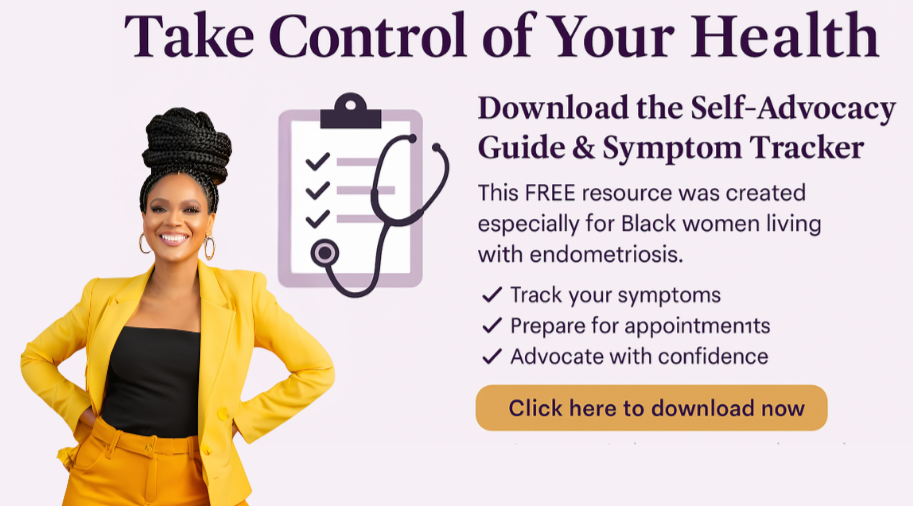
by Tara E l March 15, 2025
Endometriosis is a condition that affects an estimated 1 in 10 women of reproductive age. However, despite these numbers, Black women are often left out of the conversation surrounding diagnosis and treatment. Studies show that Black women are less likely to be diagnosed with endometriosis than white women, leading to years of endometriosis symptoms, including untreated pain and complications. For example, a recent study looked at medical records and found that 70% of people diagnosed with endometriosis were White, 6% were Hispanic, 9% were Asian, and 4.7% were non-Hispanic Black (Christ et al., 2021). But why does this disparity exist? This article explores the systemic issues contributing to underdiagnosis, the cultural and societal factors at play, and what Black women can do to advocate for their health.
Listen to the Podcast Endometriosis and the Silent Struggle
Historical and Systemic Barriers to Diagnosis
Many people believe that women of African descent rarely get endometriosis. However, it is one of the main reasons African American women in the U.S. have gynecologic surgery (Kyama et al., 2007). One of the main reasons Black women are underdiagnosed with endometriosis is the long-standing racial bias in medicine. Even when things like healthcare access and living conditions are taken into account, there are still racial and ethnic differences in health experiences and outcomes. Historically, Black women’s pain has been dismissed or downplayed by medical professionals, leading to delayed or incorrect diagnoses. Medical studies show that healthcare providers are less likely to believe Black patients when they report pain. It is a bias rooted in the false belief that Black people have a higher pain tolerance.
Endometriosis research has predominantly focused on white women, leaving a gap in understanding how the condition affects Black women specifically. This lack of representation in medical studies means that Black women are often misdiagnosed with other conditions, such as fibroids and pelvic inflammatory disease. They are sometimes told that their endometriosis symptoms are normal.
Cultural and Societal Factors
Beyond medical bias, cultural and societal factors also play a role in the underdiagnosis of endometriosis in Black women. Many Black women grow up in communities where discussions about reproductive health are limited. Painful periods are often normalized, and seeking medical help for menstrual issues may be discouraged or seen as unnecessary.
Additionally, the strong Black woman stereotype can prevent many women from seeking help. The pressure to endure pain and push through discomfort means that some Black women do not seek medical attention until their symptoms become unbearable. The disease may have progressed significantly by then, making treatment options more complex.
How Black Women Can Advocate for Themselves
While systemic changes are necessary to address the racial disparities in endometriosis diagnosis, there are steps Black women can take to advocate for themselves:
- Track Symptoms: Keep a detailed record of symptoms, including pain levels, cycle irregularities, and other health issues.
- Seek a Second Opinion: If a doctor dismisses your symptoms, do not hesitate to find another healthcare provider who takes your concerns seriously.
- Find a Culturally Competent Doctor: Look for doctors who understand Black women’s unique health challenges.
- Join Support Groups: Connecting with other women with endometriosis can provide emotional support and valuable medical advice.
- Educate Yourself: Stay informed about endometriosis, its symptoms, and available treatment options to make empowered healthcare decisions.
Taking the Next Step: Advocate for Your Health
If you’re reading this and seeing yourself in this article—if you’ve ever had your pain ignored, your symptoms misdiagnosed, or your voice dismissed—know this: you are not alone, and you are not powerless.
To support your journey, we’ve created a free downloadable Self-Advocacy Guide & Symptom Tracker for women navigating endometriosis. This resource is designed to help you:

- Track your daily symptoms and patterns
- Prepare for medical appointments with confidence
- Understand your rights in healthcare spaces
- Connect with culturally competent providers and support networks
📥 Download your copy here:
👉🏾 Self-Advocacy Guide & Symptom Tracker PDF
Your health matters. Your story matters. Use this guide to speak up, stand firm, and get the care you deserve.
What about the Health Care Providers?
Doctors should consider endometriosis as a possible diagnosis for all patients who have symptoms like severe menstrual cramps, pelvic pain, or trouble getting pregnant, no matter their race or background. They should also be aware of personal biases and use resources to help them be fair in their care. Both patients and doctors should understand that endometriosis can look different in each person, with various symptoms, ways it appears in the body, and other health conditions that may come with it.
Conclusion
Endometriosis is a serious health condition that affects Black women at the same rate as other racial groups, yet many go undiagnosed and untreated. The combination of medical bias, cultural stigma, and systemic healthcare disparities has led to this silent struggle. However, by raising awareness, advocating for better care, and breaking the silence surrounding reproductive health, Black women can take control of their well-being and push for the medical attention they deserve.
Sources:
Bougie, O., Nwosu, I., & Warshafsky, C. (2022). Revisiting the impact of race/ethnicity in endometriosis. Reproduction & fertility, 3(2), R34–R41. https://doi.org/10.1530/RAF-21-0106
Christ JP, Yu O, Schulze-Rath R, Grafton J, Hansen K, Reed SD.2021Incidence, prevalence, and trends in endometriosis diagnosis: a United States population-based study from 2006 to 2015. American Journal of Obstetrics and Gynecology 225500.e1–500.e9. ( 10.1016/j.ajog.2021.06.067)
Kyama CM, Mwenda JM, Machoki J, Mihalyi A, Simsa P, Chai DC, D’Hooghe TM.2007Endometriosis in African women. Women’s Health 3629–635. ( 10.2217/17455057.3.5.629)
🎙️ Listen to “The Rooted Will, Rising Advocate” Podcast
Dive deeper into this topic with our podcast episode: Endometriosis and the Silent Struggle! Join us as we explore the struggles many women with endometriosis face, including misdiagnosis, delayed treatment, and outright dismissal by some healthcare providers. In this episode, we are breaking down why Black women’s pain is ignored, the lack of research in Black communities, treatment options, and how to advocate for proper care. Tune in for advocacy tips, advice, and resources to help you take control of your health. #Endometriosis #BlackWomensHealth #MedicalBias
🎧 Listen now and gain valuable insights:
💡 Why tune in?
- Get perspectives on Endometriosis
- Gain insight into the unique challenges Black women face
- Stay inspired and informed with every episode.
🔗 Subscribe to the podcast on Spreaker or find it on your favorite platforms like Spotify, Apple Podcasts, and Google Podcasts.
More from Mahogany Speaks to You

Understanding Endometriosis in African American Women

Managing Endometriosis Naturally—Holistic Approaches for Black Women
.

Kidney Disease in Black Women: What to Ask Your Doctor